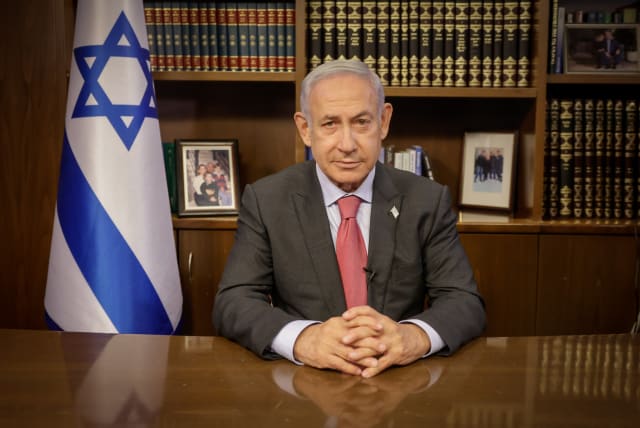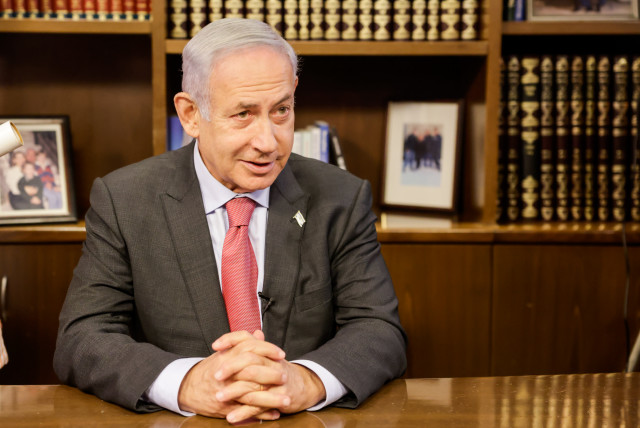WATCH: Netanyahu says US-Israel ties as strong as ever in exclusive 'Post' interview

DIPLOMACY: Netanyahu: We will proceed with a moderate version of judicial reform; absence of White House invitation is not a bad sign
The past six months have been exceedingly turbulent, even by Israeli standards. Between repeated, disruptive mass protests against the government, a judicial reform aiming to overhaul an entire branch of government, rookie cabinet ministers with unorthodox views shocking allies and threatening rebellion, a defense minister fired and unfired, terrorism in the West Bank, another mini-war with Gaza and attacks from Lebanon, plus the prospect of a new agreement between the US and Iran, Israel has felt like it is on the brink.
And then there’s the mainstay: Prime Minister Benjamin Netanyahu. He returned to the premiership late last year after a little over a year leading the opposition, a brief interlude in his 16 nonconsecutive years of power, the longest for any Israeli prime minister.
Speaking in a small studio in the Prime Minister’s Office set up to look like his actual office, Netanyahu seemed determined to give the impression that everything is normal – or, at the very least, that he has a steady hand steering the Israeli ship.
The economy is doing great, he said, despite credit agencies’ lowering Israel’s outlook; they didn’t lower Israel’s rating and investments are flowing into the country, evidence, he suggested, that the judicial reform is actually helping Israel economically. The absence of a White House invitation belies how close the Biden administration is with Israel, and how much more transparent he and US President Joe Biden are with one another, compared to his relationship with Biden’s predecessor, Barack Obama. Even a new Iran deal didn’t raise Netanyahu’s hackles.
The Jerusalem Post is the first Israeli media outlet to interview the prime minister since his comeback, other than the overtly pro-Netanyahu Channel 14, and the first newspaper to do so. The Post agreed to film this interview and make it available in full to the public as a video; it is available on our website, JPost.com.
The wide-ranging interview took place before the IDF raid on Jenin or the deadly Palestinian terrorist attack outside Eli this week, though he dropped a hint that there were dramatic days ahead. The conversation has been edited for clarity.
The Jerusalem Post: We want to start with judicial reform. We understand that this week you announced that you will be advancing certain pieces of legislation, including the absence of a judicial review or a diminished review on certain appointments. Will that be accepted by members of your coalition? Will they be okay with you not proceeding with the entire legislation at this time?
Netanyahu: I think everybody understands that we should proceed in a measured way, in a way that doesn’t move the pendulum from one side of complete judicial activism and complete control by the Supreme Court of the other branches of government to the other side, where you’d have the legislature and the executive of the government controlling the Supreme Court. You need a middle ground. And I think there are ways to proceed with measured steps, and that’s what I intend to do.
If you ask me, for example, on the question of reasonableness, is it reasonable that judges could cancel decisions by the government not based on any law, but on something that any judge can arbitrarily decide is reasonable or unreasonable? That’s not reasonable. If you had a secret vote, a secret ballot in the Knesset, I’ll bet you 100 Knesset members out of 120 would agree with that. Politically, you know, people are constrained by all sorts of pressures.
I’m trying to bring what I think is fair and sound to the mix and do it step by step rather than going to very harsh decisions. I think we should take the lessons of the last few months. We tried to have a consensus in the talks. We saw that we couldn’t get any minimal understanding. Rather than be stymied by that, I think we should just move in a more measured way.
Do you feel that this has been an unnecessary distraction and you have found yourself enmired in this topic as opposed to in other things you wanted to accomplish during your first months in office? Has this been worth it to you?
I think the majority of the public understands that there needs to be judicial reform. I think there’s consensus that has to be done, as I said, in a more measured way. And that’s what we’re doing. But no, I don’t think you can put aside judicial reform, I just think you should do it right.
If you think that I haven’t done other things, well, we have quite a few. Not only in the field of security, in the field of statesmanship, the field of the economy, and in many other fields. We’re active; it’s just the media just doesn’t pay any attention to it. But it doesn’t mean that we don’t pay attention to it or that I don’t pay attention to it. We do.
I think we’re progressing in important ways. Some of them, I hope will come to the surface very soon.
The shekel is pretty weak right now. Some have argued that the judicial reform is hurting Israel economically and that the negative international perception of the reform is hurting us.
I think the Israeli economy is very strong. You saw that despite the turbulence and all the hype, the rating agencies maintained Israel’s positive rating, a high rating. [On Sunday], we were informed about this massive investment in Israel by Intel of $25 billion. It’s the biggest investment in Israel’s history. You don’t do that in a weak economy.
I think overall, when you see the basics of the economy, they will ultimately speak and they do right now. I’m not impressed by the daily volatility of the stock market or the exchange rate. I look at the long term, and the long term is that I’ve led a free market revolution in Israel’s economy. And it’s a very strong one in a knowledge-based global economy. We’re moving into AI with full force – and that’s not hype either. Israel is receiving 20% of the world’s investments in AI start-ups, and more will come. I think Israel’s economy is strong, and it will stay strong. The judicial reform will not in any way hurt it; it will only support it.
How is your relationship with Biden and his administration? They seem pretty unhappy about judicial reform and also the recent decision to expedite the process for building homes in Judea and Samaria.
We have an unbreakable bond with the United States, not only because I said it and not only because they said it – because it’s true. Israel’s value to the United States is growing as we enter a knowledge-based global economy. As well as being the innovation nation, it’s what we produce in [intelligence], what we produce in cyber, what we produce in civilian technology, what we produce in defense technology [that] is becoming increasingly valuable to the United States. We learned something in the COVID experience, that we need to have the partnership of like-minded nations and like-minded smart nations. And Israel is certainly in that category. The Americans understand it.
That doesn’t mean we don’t have differences between us. We do. We’ve always had them. But I can tell you that the cooperation that Israel has today with the United States on intelligence, on security matters, is probably at its highest point.
I’ll also say that it’s a transparent relationship. That has not always been the case. You know, I had more meetings with President Obama than any other leader in the world. I couldn’t have said that we were transparent in those times – but I am saying that about now. We have this constant contact. I spoke with the president on the phone several times. Jake Sullivan, the national security advisor, came here and we’ve spoken on the phone several times. So did the Secretary of State [Antony] Blinken, so did the head of the CIA. I sent Tzachi Hanegbi, the head of the National Security Council, with the [Strategic Affairs] Minister Ron Dermer to Washington, they’ve had very intense talks about Iran and about other matters. So I can say that the relationship is as strong as it’s ever been. It doesn’t mean we don’t have disagreements; we do, but they’re disagreements within the family.
Do you think you’ll be able to visit the White House anytime soon?
I’m sure. But that’s a question you’ll have to ask President Biden directly. This hasn’t stopped and hasn’t prevented us from being, as I said, in very close contact, having cooperation, and having the largest military joint exercise that Israel had with the American military in our history. I think that’s proceeding very favorably. Again, there are things we disagree on, and I don’t hide it. People know my views. But you can have that among sovereign states and among allies.
So when you say there’ll be more transparency with the Biden administration, does that mean that you’ll have no surprises, as the previous government put it?
When I said that we’re transparent with each other, [I meant that] we tell each other what our positions are very clearly. As far as “no surprises,” I never agreed to this. And the reason is because I want to maintain Israel’s freedom of action. In fact, when I met the Secretary of Defense [Lloyd] Austin, he asked me about that. I said, look, on this question of what Israel will do, or will not do vis-à-vis Iran, you know, we will tell you sometimes and we won’t tell you other times. I’m being completely transparent about the fact that we’re not going to be transparent completely on this.
People laughed, but it was not a joke. That was truthful. I find that the administration is quite open with us on these matters, and where we understand that and we disagree, we also understand we can contain our disagreements, but Israel will maintain its freedom of action against Iran, as it sees fit.
The Abraham Accords are perhaps regarded as one of your crowning diplomatic achievements, and you’ve spoken quite extensively about the need to expand them to Saudi Arabia and perhaps other countries. It has been suggested that there will be certain concessions that would be required by Saudi Arabia in order for that to happen, perhaps progress with the Palestinians or perhaps the development of a civilian nuclear program. What would you be willing to concede?
Well, the one thing I don’t want to do is to be transparent outside the room. That is, I don’t think it makes sense to talk about these things. I think if the Saudis want a normalization agreement with Israel, we’ll get it. It’s up to them in many ways, but I don’t think it makes sense to get into the details of these things.
I’ll always have Israel’s security interests, foremost in my mind, in any process. I think that we created a different model that doesn’t put everything through the Palestinian prism. That’s the reason we got the Abraham Accords, because for a quarter of a century, before we had the Abraham Accords, people said you can’t get peace with the Arab states unless you first solve the Israeli-Palestinian problem. That was a guaranteed avenue to failure because the Palestinians don’t want peace with Israel. They want it without Israel. So if you wait for the Palestinians, you will wait another quarter of a century. I think people understand that.
As far as what this peace would look like, what this normalization would look like, what the Saudis would give, what Israel would give, what the US would give, I think it’s best left [secret]. I’ll say this, I believe in open covenants secretly arrived. Remember Woodrow Wilson said “open covenants [of peace] openly arrived at”? Well, my practical experience has been open covenants secretly arrived, or at least discreetly arrived at. Otherwise, you don’t get very far.
The Biden administration is approaching a new, smaller deal with Iran, and you’ve been quieter than you were back to them. Why is that?
Well, it’s a smaller deal. That’s the first thing. I think the worst thing is a big deal that doesn’t set back Iran’s nuclear infrastructure in any way, but gives them megabucks, hundreds of billions of dollars with which to finance their terror and their aggression. I think that doesn’t make sense with the sunset clauses in which they’re really relieved from any limitation on their nuclear program within a few years. That’s the original deal, called the JCPOA. I think that was bad. I don’t think there’s anyone on the planet who doesn’t know my view on this, and it hasn’t changed.
The so-called “mini deal” is something that we’re aware of. It’s not that it was flung on us. It is flawed in that it doesn’t set back Iran’s infrastructure, and it does give them a measure of money, which I think they’ll use for bad. But it’s not quite as bad as the first thing. My view on both is the same and I express it.
You said earlier this week in the Knesset Foreign Affairs and Defense Committee that Israel can live with or can handle the new Iran deal. What does handling it mean?
No, I said something else and I’ll say it again here. I said that under a big deal, a mini deal, or no deal, Israel will retain the freedom of action to defend itself by itself, regardless of any such arrangement. Because my first responsibility as the prime minister of Israel is to protect Israel and defend it against Iran’s quest for nuclear weapons, which is openly declared by them to be used against us. We’re not going to accept that.
Some of your coalition partners have expressed the intention to make the Law of Return the next battleground. They want to amend it and to limit its application. Is that something that you are willing to consider?
I would be very careful of toying with the Law of Return because it’s a fundament of the Jewish state. I think you have to be very careful. I think I led a free market revolution in Israel’s economy because everybody agreed that socialism is not the best way to grow our economy. So there we had a revolution. I’m not a revolutionary in matters that define the foundations of the Jewish state in any way, I would tread very carefully on that.
To what extent do you take the concerns of Jewish communities around the world into account in determining whether or not to proceed, for example, on a question like the Law of Return?
Well, I do. That’s why I’m very careful about it.
This government seems to have shifted slightly on the war in Ukraine and is helping Ukraine a little bit more with a missile warning system. Why was there a shift? And are we going to see more of that?
I think Israel is in a peculiar situation, different from say, Poland or Germany or France or any of the Western countries that are assisting Ukraine. First of all, we have a close military border with Russia. Our pilots are flying right next to Russian pilots over the skies of Syria. And I think it’s important that we maintain our freedom of action against Iran’s attempts to place itself militarily on our northern border.
Second, we also have concerns that any systems that we give to Ukraine would be used against us because they could fall into Iranian hands and be used against us. And by the way, that’s not a theoretical possibility. It actually happened with the Western anti-tank weapons that we now find at our borders. So we have to be very careful here.
We obviously bemoan the tragedy that’s happening in Ukraine, this horrible loss of human life. We’d like to see it end. And I think we’re also in a special situation where we might find ourselves in the future in a position to help end this conflict. I’m not sure that will happen. It may be entirely hypothetical, but it could happen.
So I think that the balanced way that we are acting is the right one. You have to be very prudent in international affairs. There is sympathy, there is civilian defense assistance. But I think we have to draw the line carefully and people understand. I have to say that most of the heads of governments of Western countries, when I explained this, they basically nod in agreement. They understand that Israel is in a different situation from any one of them.•
Jerusalem Post Store
`; document.getElementById("linkPremium").innerHTML = cont; var divWithLink = document.getElementById("premium-link"); if (divWithLink !== null && divWithLink !== 'undefined') { divWithLink.style.border = "solid 1px #cb0f3e"; divWithLink.style.textAlign = "center"; divWithLink.style.marginBottom = "15px"; divWithLink.style.marginTop = "15px"; divWithLink.style.width = "100%"; divWithLink.style.backgroundColor = "#122952"; divWithLink.style.color = "#ffffff"; divWithLink.style.lineHeight = "1.5"; } } (function (v, i) { });


